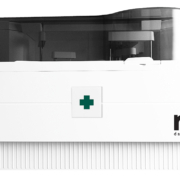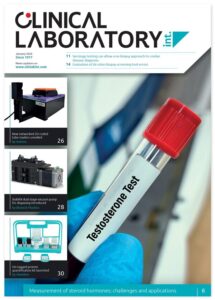Direct HbA1c testing capabilities on the RX series range of clinical chemistry analysers
The global prevalence of diabetes mellitus is increasing rapidly; affecting 8.8% of the population. The Randox automated immunoturbidimetric HbA1c test offers an improved method for the rapid direct measurement of HbA1c in human blood; which is available for use on the RX modena, RX imola and the RX daytona+.
Introduction to the RX series
The RX series combines robust hardware and intuitive software with a world leading test menu comprising of routine chemistries, specific proteins, lipids, therapeutic drugs, drugs of abuse, antioxidants and diabetes testing and a range of niche tests including the HbA1c assay. The RX series removes the need for a separate HbA1c analyser and allows laboratories to expand their testing capabilities onto one single platform, providing cost savings through consolidation. Built on three core values- reliability, accuracy and precision, the RX series reduces costly test re-runs and misdiagnosis, offering complete confidence in results. The RX series range of clinical chemistry analysers includes the RX misano, (semi-automated) RX monaco, RX daytona+, RX imola and RX modena.
Background
Diabetes is a global epidemic that affects approximately 271 million people around the world and according to the International Diabetes Federation; it is a figure that is on the rise. Their calculations forecast that diabetes will affect roughly 552 million by the year 2030, highlighting the fundamental need to manage patients with diabetes. The USA is one of the most prominent countries affected by diabetes when analysing its prevalence worldwide. It affects roughly 24 million Americans which is a stark contrast to the UK where around 3.5 million people have been diagnosed. It is also important to note that serious health complications can result from diabetes over time which reinforces the need to test HbA1c levels to evaluate how well diabetes is being controlled. The longer you have diabetes, the higher the risk of complications. These can include cardiovascular disease, nerve damage and kidney damage; including end-stage kidney disease which can require dialysis or a kidney transplant. With the rising figures and growing list of complications associated with the disease, diabetes remains one of the leading causes of death in the world and the seventh leading cause of death in the US.
HbA1c explained further
HbA1c, also known as hemoglobin A1c or glycated hemoglobin, is an important blood test that is able to determine how well diabetes is being controlled. It develops when hemoglobin, a protein within red blood cells that carries oxygen throughout the body, joins with glucose in the blood, becoming ‘glycated’. As glycation is irreversible, HbA1c remains in the same state in the red blood cell for 8-12 weeks; giving an overall picture of what the average blood sugar level is. This is particularly important as it allows clinicians to monitor the ‘glycemic’ control in individuals with diabetes.
What is the HbA1c assay used for?
The concentration of HbA1c in the blood of diabetic patients increases with rising blood glucose levels and is representative of the mean blood glucose level over the preceding six to eight weeks. HbA1c can therefore be described as a long term indicator of diabetic control unlike blood glucose which is only a short term indicator of diabetic control. It is recommended that HbA1c levels are monitored every three to four months. In patients who have recently changed their therapy or in those who have gestational diabetes it may be beneficial to measure HbA1c levels more frequently, at two to four week intervals. The onset of diabetes, particularly type two diabetes, tends to be gradual and thus proves difficult to diagnose early. With HbA1c clinicians are able to monitor blood glucose levels periodically to deliver accurate and quick results that can improve patient care.
The clinical significance of HbA1c
The measurement of HbA1c is used in the long term monitoring of diabetes mellitus. This assay should not be used in the diagnosis of diabetes mellitus or for day to day glucose monitoring. Diabetes mellitus is a disease associated with poor glycemic control. Numerous clinical studies, including the Diabetes Control and Complications Trial, have shown that diabetes-related complications may be reduced by the long term monitoring and tight control of blood glucose levels. In the diabetic patient where blood glucose levels are abnormally elevated the level of HbA1c also increases, the reason for this is that HbA1c is formed by the non-enzymatic glycation of the N-terminus of the ß-chain of hemoglobin A0.
Randox HbA1c assay features:
- Sample type – suitable for use with whole blood samples
- Latex enhanced immunoassay method – the Randox assay utilizes an immunoassay method making it simple and quick to perform.
- Liquid ready to use reagents – for ease of use and convenience
- Excellent stability – all reagents are stable to expiry date when stored at +2-8ºC or 28 days on board the analyser at approximately 10°C.
Advantages of the RX series clinical chemistry analysers for direct HbA1c testing:
- Fully automated on-board haemolysis function for HbA1c testing
- Continuous loading & STAT sample functionality to enhance productivity in the laboratory- analyser dependant
- Low sample volumes required
- 1200 tests per hour including ISE (RX modena)
- User friendly software
- Low water consumption
- Dual 5 speed stirrers optimized for reach chemistry reaction
- Reagent micropipette with liquid level sensor and crash detection
- Liquid level sensor, crash, bubble and clot detection
Key benefits of using the RX series clinical chemistry analysers and Randox HbA1c assay
Direct HbA1c testing eliminates the need for the sample incubation step which is required on alternative methods; allowing samples to be to run immediately on the RX series and providing faster and more accurate results when they are needed. The removal of the offline preparation stage increases the recovery times, allowing laboratories to enhance their workflow and also consolidate testing onto one single clinical chemistry platform. Additional benefits of using the RX series in conjunction with the Randox HbA1c assay include having one assay instead of two, which enables quicker calibration; saving the user time and making the overall method simple and quick to perform, setting a new standard in HbA1c determination and patient care.
For further information or for a quotation for the HbA1c test or to enquire about any analyser in the RX series range, please contact marketing@randox.com.
Randox Laboratories Ltd
55 Diamond Rd
Crumlin, Co. Antrim BT29 4QY
UK
www.randox.com



